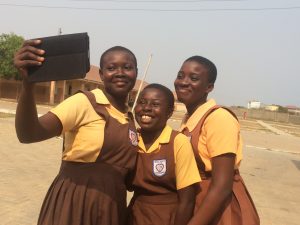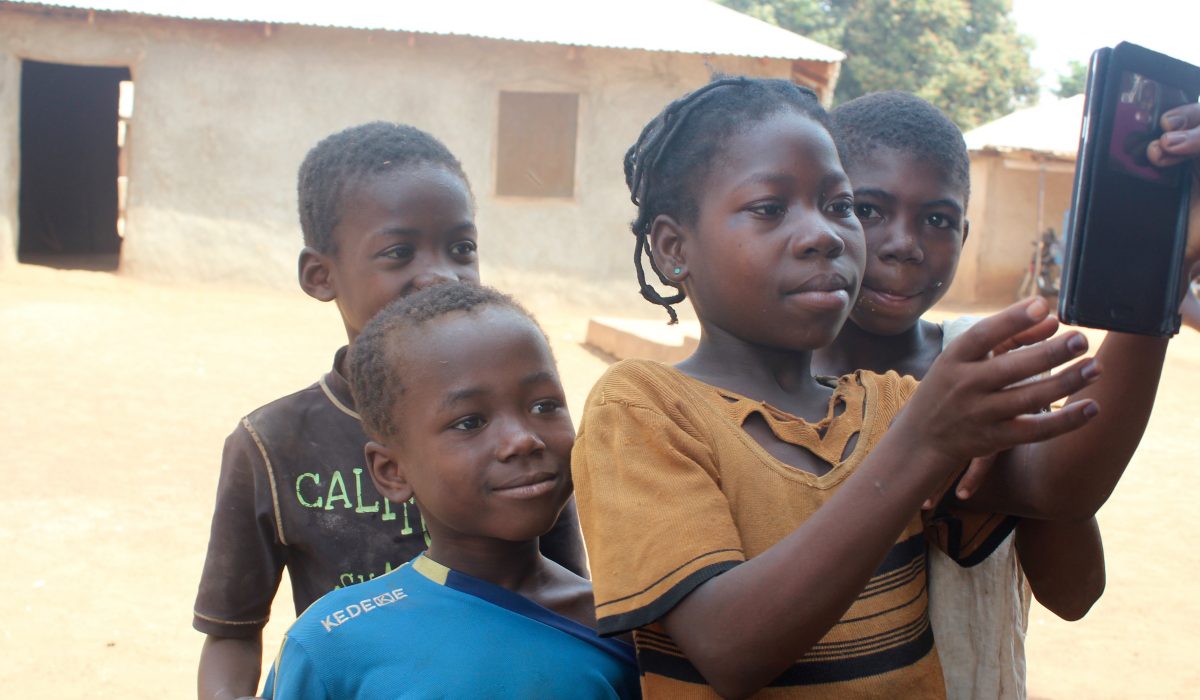
Image credit: UNICEF Ghana
The study of children’s online experiences in Ghana was carried out by UNICEF Ghana and involved a survey with 2,000 children aged 9 to 17 years and 1,000 parents with pre-determined quotas by location, gender, and age of the child. In addition, in-depth interviews and focus groups were conducted with children, parents, internet providers, policymakers and stakeholders from the government and civil society organisations.
Key findings from the research include:
- Children start to use the internet at an early age, but their parents or guardians are not as connected: the average age of first internet use for children in Ghana is 12 and has been dropping over the past years. Over a third of children (36%) are able to access the internet when they need to and only 3% have never used the internet. Boys tend to have slightly better access opportunities than girls (39% of boys and 31% of girls are “often” or “always” able to access the internet when they need to) as do older children and those living in urban areas. In comparison, more than half of the parents (55%) have never accessed the internet and mothers are overrepresented amongst the non-users (63% compared to 43% of fathers).
- Children predominantly use the internet at home and on a smartphone: the most popular locations for internet access are children’s home (81%) and school (23%). Children mostly go online via a mobile phone – 65% use a smartphone and a further 21% use a non-smart mobile phone. Over a quarter (27%) use a desktop computer, while few use laptops (7%) or tablets (2%).
- Learning, socialising and entertainment are amongst the most popular activities that children engage in when they are online: A range of learning activities are amongst the most popular endeavours for children in Ghana: 70% learn something by searching online and 60% use the internet for homework or study. When using the internet at school, children most often do group work with others (27%), write things (26%) or create drawings or pictures (25%), or practice something they are learning (26%). Social and entertainment activities online are also popular – 66% use social networking sites and 55% – instant messaging; about a third listen to music (39%), watch videos (36%), or play online games (30%). Children also create some online content – posting comments or photos (52%), videos or music (25%), but they are much less engaged in the more demanding creative activities, like creating a website or blog story (8%) or creating and posting own music (17%). They are also less likely to get involved in civic participation (joining an online campaign – 7%; joining a civil, religious or political group – 9%), or selling things online (5%), which is similar to children in other countries in the Global Kids Online study.
- The majority of children feel safe online but many face risks of harm: more boys (65%) than girls (60%) report feeling safe when online but a quarter (25%) say that something upsetting has happened online, with 16% saying that they have been treated in a hurtful way by someone else. Boys, older children and those living in urban areas report upsetting incidents more often. Sexual content, hurtful comments, fraud, or violence are amongst the things that children find upsetting. In many of these cases, parents are not aware of the incidents – less than 1 in 10 thought that something upsetting had happened to their child online.
- Children feel that they know a lot about the internet but there are important gaps in their digital skills: half of the children say that they know a lot about the internet and 6 in 10 say that they know more than their parents. However, less than half know how to change their privacy settings (45%), know how to remove people from contact lists (48%) or know which information to share online (46%); only about a third find it easy to check if the information online is true (38%) or to decide if a website can be trusted (30%). Girls, younger children and those living in rural areas have consistently lower digital skills, and parents are overall less skilled than children (though parents who are frequent users are on par with or possess greater skills than children).
- When they need help, children most often turn to their peers: over half of children ask a friend for help when something bothered them online (54%) and about one in five turns to a family member (22% to a parent and 19% to a sibling). Over one in ten children do not speak to anyone (13%) and very few talk to teachers (4%) or other professionals (1%). In addition, the majority of children say that their parents do not talk to them about using the internet safely (70% never or hardly ever), nor do they talk to them about upsetting things that happened online (80%)
The Minister for Communications Mrs Ursula Owusu-Ekufu commented on the findings:
“As we scale up our digitalisation efforts and increasingly embrace technological advancements, it is important that our cyber preparedness and security also improve and a comprehensive child online protection strategy is critical to achieving this. I am optimistic that this report will strengthen our efforts to formulate policies and develop programme interventions that will protect children and support safe use of the internet.”
The UNICEF representative in Ghana Anne-Claire Dufay outlined the contributions of the research in the following way:
“The study shows how the internet and digital technology are helping and hindering children’s learning, well-being, and social relationships. It further outlines some practical recommendations that can guide more effective programming to amplify the opportunities the digital world offers to children, and to reduce the risks they have to contend as users”.
More about the research in Ghana
Post authors: Joyce Odame and Mariya Stoilova
You can sign up to receive the latest research news from Global Kids Online by email. Please forward this message to anyone you think may be interested.








